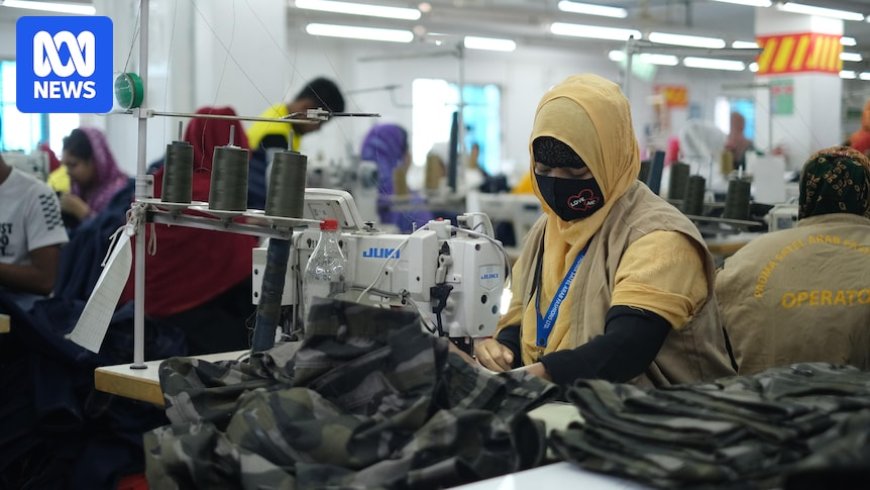Mosaic Brands' Collapse Impacts Female Factory Workers in Bangladesh
Creditors are set to decide the fate of Mosaic Brands, leaving Bangladeshi garment suppliers facing layoffs due to unpaid orders. Around 40,000 workers are affected, with factory owners struggling to cope with the financial fallout.

Creditors owed more than $361 million are set to vote on the future of failed Australian retail giant Mosaic Brands, as Bangladeshi garment suppliers flag mass lay-offs as the result of millions in unpaid orders.
Bangladeshi factory owner Jabed Ahmed faces debt of around $2.5 million after Mosaic, which owns Noni B, Millers and Rockmans among other brands, went into voluntary administration in October last year. He told the ABC his company, Padma Satel Arab, has had to fire around 500 workers as a result. Other suppliers have already closed down.
At least 23 factory owners in Bangladesh were owed a total of $US19.93 million ($30 million) by Mosaic when the company went under. Months later, the costs and fallout have snowballed.
Mosaic's collapse ripples through the supply chain. Mosaic's administrators FTI Consulting have recommended liquidation of Mosaic and its brands, which also include Rivers and Pretty Girl Fashion Group. More than 4,000 Australian employees from over 600 stores across the country will be paid as a priority, according to Australian law.
Darren Vardy, director of Insolvency Options, which is representing the creditors, said factories and workers overseas were likely to get nothing. Under the best-case scenario outlined in the report, they will get back 17.5 per cent of what they are owed.
Yet the collapse of Mosaic Brands has left a trail of devastation in Bangladesh. Factory owners have been forced to sack workers and face mounting pressure from local banks after millions in orders went unpaid. For the Bangladeshi suppliers in Mosaic's supply chain owed millions, around 40,000 workers are affected, according to a letter sent to the Bangladesh Garment Manufacturers Association.
FTI Consulting's initial report to creditors said Mosaic Brands had likely been trading for years while insolvent. This carries serious penalties under Australia's Corporations Act. The report also notes the company had been claiming safe harbour for trading after the pandemic.
Any legal action over insolvent trading could hold some or all directors personally liable, forcing them to repay from their own pockets. FTI Consulting also raised concerns over improper financial reporting. University of Sydney law professor Jason Harris, who researches insolvency, said the case exposed serious regulatory and governance failures.
Mosaic said in August last year that consultancy firm Deloitte had been advising the company on refinancing considerations. Bangladeshi factory owner Nafis Ud Doula, from Impress Newtex Textiles, said Mosaic had strung him along with new orders.
Thousands of workers could lose their jobs in Bangladesh as Mosaic Brands defaults. Mosaic Brands did not reply to the ABC's requests for comment. Former Mosaic director Scott Evans, who served from 2014 until early 2024, also did not respond to the ABC's inquiries.
FTI Consulting's report showed that between 2021 and October 2024, Mosaic experienced cash flow difficulties and only recorded a surplus in one month of that period. Gazi Abdullah Al Mustafiz, merchandising manager of SMUG Sweater, is owed more than $2 million for garments already delivered or sitting idle on factory floors.
In Bangladesh's garment industry, factories rely on complex financing mechanisms tied to letters of credit that are needed for international trade payments. When a brand like Mosaic places an order, suppliers buy fabric and raw materials using credit from local banks.
The result is a spiralling debt crisis: suppliers trapped between unrelenting loan repayments and millions in unpaid invoices for goods already received by Mosaic and its companies in Australia. Safe harbour laws protect directors from personal liability for insolvent trading if certain conditions are met.
Mosaic could prove a test case of Australia's safe harbour provisions, which were only introduced in 2017, Professor Harris said. Thousands of workers in Bangladesh at risk. Back in Bangladesh, NRN Knitting and Garments senior merchandiser Moin Uddin is one of the worst-affected factory owners.
He said more than $3 million worth of garments had been shipped to Australia without payment, while finished stock sat in his warehouse. Factory owners have sent a letter to the Australian High Commission in Bangladesh about what they are owed. Mr Ahmed had planned to modernise production lines and invest more in sustainability, which he has had to put on hold. It's not just business — it's people's lives.
What's Your Reaction?
 Like
0
Like
0
 Dislike
0
Dislike
0
 Love
0
Love
0
 Funny
0
Funny
0
 Angry
0
Angry
0
 Sad
0
Sad
0
 Wow
0
Wow
0














































































































































